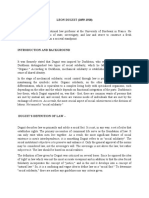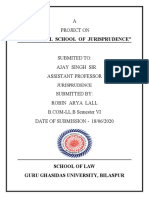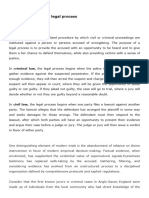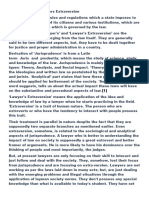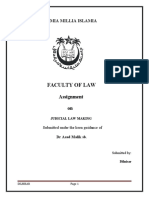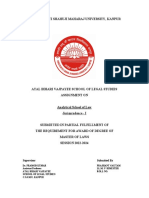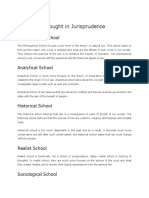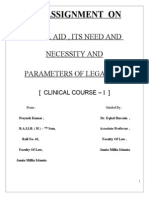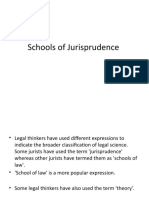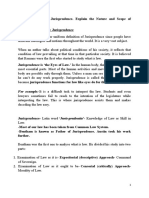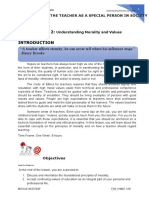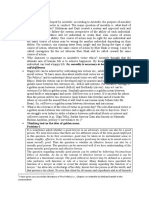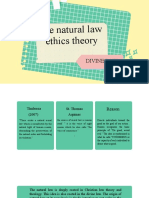LEON DUIGUIT’S THEORY OF LAW
(Khushi Goyal)
(Roll NO.- 22LLM026)
Abstract
The main focus of jurists belonging to sociological school is to study the effect of
law and society on each other. Sociological jurisprudence is usually described as
'functional jurisprudence, or jurisprudence of interest, or jurisprudence of social
engineering, or experimental jurisprudence.’ Jurists belonging to this school look
upon law as social phenomenon. It strives to study law in terms of immediate needs
and requirements of individuals and other varying individual group. The aim of
Duguit is to evolve a science of Law & Politics free from all fictions and
metaphysical notions. In this article author deal with the ‘Theory of Social
Solidarity’ propounded by Duguit along with its criticism.
INTRODUCTION & BACKGROUND
Duguit is a great French jurist of Sociological School. Being a professor of
Constitutional Law at the University of Bordeaux, he defines Constitutional Law
and economics are branches of Sociology and are positive and observational
sciences. He defined Constitutional Law as “the systematic study of the facts
relative to the origin of the State, its development in ancient societies and its forms
in contemporary societies with a view to determine its forms in the society of the
future."1 He belonged to the age of collectivist legislation. Collectivism is a political
theory which stresses that the needs and goals of the individual must be subordinate
to those of groups. In other words, will of the people is omnipotent and society as
a whole is the unit of moral value.
Duguit was inspired by Durkheim who himself has influenced from Comte. Comte
was the first one who reinvented or popularised the term ‘sociology’ which he
elucidates as a positive science of social facts. According to him, ‘society’ is an
organism which can progress when guided by scientific principles which should be
formulated by observation and experience of facts excluding all metaphysical and
similar considerations.
1
3 Revue de l'Enseignement, 1889, pp. 484-505, on the whole of this paragraph.
� Durkheim distinguished two types of social solidarity- Mechanical solidarity,
which is based on likeness and a sense of common identity. It is found in
homogeneous society. Earlier undeveloped society, men recognised the need for
mutual assistance and the combining of their aptitudes. People are bound together
by the fact that they have shared a common conscience and the other one is Organic
Solidarity, which is based upon the functional interdependence of men and is found
in heterogeneous society.
Duguit built his theory of mutual interdependence on the basis of two kinds of
needs. Firstly, there are common needs of individuals which are satisfied by mutual
assistance. Secondly, there are diverse needs of individuals which are satisfied by
the exchange of services. He defined this ‘Division of Labour’ as ‘social solidarity’
which is a fact and is necessary for social life.
He developed the theory of Social Solidarity at a period when the doctrine of
individualism was crumbling in Europe being replaced by a new philosophy of
collectivism.
SHIFT FROM LAISSEZ FAIRE TO WELFARE STATE:
➢ Sociological school developed around 19th to 20th century. During this era,
Laissez faire doctrine was playing a significant role. People witnessed a shift
of emphasis from individual to society.
➢ In the 19th century because of adverse effect of laissez faire doctrine, state
became more and more concerned with numerous matters encompassing
almost all aspects of human life & welfare like health, education, security etc.2
THEORY OF SOCIAL SOLIDARITY
➢ One of the outstanding features of society is interdependence of men for their
needs which means active cooperation among members of society. According
to Duguit’ solidarity’ or ‘cohesion’ is the principal of existence of social life.
➢ All human activities, organisation should be directed to the end of ensuring the
smoother and fuller working of men with men.
➢ Social interdependence is an inevitable characteristic of human existence. He
explains philosophy behind his theory is that an individual cannot procure
necessitate of life all by himself.
2
V.D. MAHAJAN, JURISPRUDENCE AND LEGAL THEORY,5th ed reprint 2006, Eastern book company, Lucknow, page
no. 605, paragraph 1
� Example: Farmers producing food to feed factory workers who produce the
tractors that allow the farmers to produce the food.
DENOUNCED STATE SOVERIGNITY & LAW
➢ Duguit denounced the traditional conception of state sovereignty, command3,
legal force, sanction and law and propounded a new approach to matters of
social jurisprudence from the angle of society. He propounded a natural law
theory with strongly sociological overtones. However, he has a conflicting
opinion regarding doctrine of natural law.
➢ Law is a rule which a man follows or obeys not by virtue of some higher
principles but because of man believes himself/herself to be a member of
society. In simple words he was expounding that law is simply a rule which
every man in a society follows to lead a righteous and civilised life.
➢ According to him there is no commanding authority or driving force at their
heads just like analytical positivists think that law is a command of sovereign.
Legislator are not creator of law but merely gives expression to judicial norm
formed by the consciousness of the social group.
LEON DUGUIT’S PERCEPTION OF RIGHTS & DUTIES-
➢ In his theory of law, there is no place for rights. He denies the existence of
rights. Right is an abstract concept. They are merely a source of conflict. He
says that if every man focuses on his right and wither away from discharging
their obligations and duties. then the only thing which can be seen in society is
conflict between individuals.
➢ He emphasises on the concept of duty. According to him, “the only right man
can possess is the right to always do his duty.” Fulfilling the social obligations
are part and parcel of social solidarity. Duties here means Jural Postulates
propounded by Roscoe Pound. His concept of ‘social solidarity’ is an
embodiment of duties.
NO DISTINCTION BETWEEN PULIC & PRIVATE RIGHTS
His views on state and its function that the state is not a sovereign power but is an
institution that has arisen out of the social needs of humans and government, like
individuals, is bound by the rules of law derived from social necessity, led him to
3
LEON DUGUIT, THE LAW AND THE STATE, 31 HARV L. REV.1 (1917)
�distinguish between private & public law. The purpose of both is to achieve ‘social
solidarity’.
CRITICISM OF DUGUIT’S THEORY
His definition is criticised on many grounds-
➢ “Social Solidarity” a Natural Principle: It has been rightly observed that
Duguit “pushed natural law out through the door and let it come by the
window.”
➢ He confuses Law with what ought to be.
➢ Social Solidarity to be decided by the judges: - His theory fails to answer
question who is to decide whether a rule or act furthers the social solidarity or
not? In reality, sovereign is still the electron in the atom of state.
➢ He overlooked the growing state activity: Society is a complex web of social
problems which can be better solved by state activity.
CONCLUSION
Sociological School of Jurisprudence studies the relationship between law and
society. It explains the interdependence of law and society. One can’t formulate
better and effective law without looking and studying the need and structure of
society. For the betterment and harmonious society, we need better and effective
laws. Every problem in India has two aspects: Legal and social one.
For instance- Delhi Gang Rape (2012) wherein change in law is legal aspect and
upholding the dignity of women is social aspect. Another example is of female
Infanticide which has punishable by Bengal Regulation XXI. In this female
infanticide was declared to be a murder and its social aspect is that nature designed
both sexes for the perpetuation of the human races.
Solidarity is also one of six principles of the Charter of Fundamental Rights of the
European Union and also in Indian Constitution in Part III & IV. Since law is a
social science, judges would not depend only on abstract principles or rigid legal
cannons alone but on social circumstances, demands and needs of a time.

